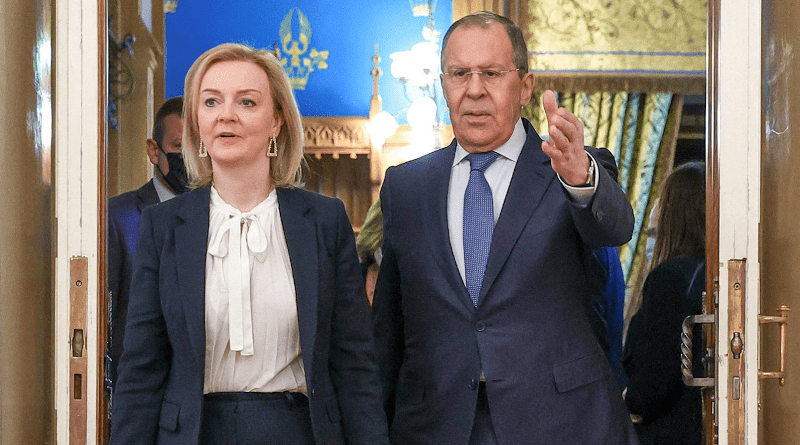Truss, Sunak Poles Apart As UK Awaits Next Prime Minister – OpEd
By Arab News
By Andrew Hammond
UK Foreign Secretary Liz Truss last month made the remarkable claim that an end is needed to what she calls a failed British consensus that has “peddled a particular type of economic policy for the past 20 years and it hasn’t delivered growth.”
Of course, such criticism would not be unusual for opposition politicians long out of power. However, what is especially surprising about her statement is that it is the Conservatives that have been in office for the last dozen of the years in question, with Truss herself serving as a minister for much of that period, including in economic portfolios.
Her assertion highlights how one of the defining features of the Conservative leadership election, which will come to a head early next week with the announcement of the next prime minister, has been ferocious critiques of the UK economy’s recent performance. Within this cauldron of discontent, the legacy of Margaret Thatcher has taken center stage, as both Truss and former finance minister Rishi Sunak try, in different ways, to position themselves as her heir.
Truss argues that, just as Thatcher tested widely held policy beliefs in the 1980s, it is time for her to do the same in the 2020s with tax cuts. Truss is therefore heavily critical of Sunak’s period in office, particularly his tax increases, even though she also served in the Cabinet at the time. She has pledged to “start cutting taxes from day one” with a new emergency budget and spending review that would reverse April’s rise in National Insurance, saving the average household about £180 ($209) a year, and abolish next year’s corporation tax hike from 19 percent to 25 percent.
She has not explained how she would pay for the £30 billion in tax cuts she has promised, but insists they can be funded within the “existing fiscal envelope.” Truss insists that cutting taxes will help curb inflation and that “what is not affordable is putting up taxes, choking off growth and ending up in a much worse position.”
However, Sunak argues that the true Thatcherite legacy is completely the opposite — as do many ministers from Thatcher’s 1980s governments. He asserts that, if she were alive in 2022, the former prime minister would favor fiscal prudence over tax cuts, given the high inflation and large public indebtedness from the pandemic.
The former chancellor has promised, in later years, to “deliver tax cuts that drive growth,” but to do so in a “way that’s responsible,” and only “after we’ve got a grip of inflation.” He claims that Truss’s plans to raise borrowing now to pay for tax cuts are “comforting fairy tales” and economically illiterate.
To be clear, this is not a trivial economic and indeed philosophical disagreement. While Truss says imposing higher taxes during a cost-of-living crisis is “morally wrong,” Sunak asserts “it’s immoral” to pass bills to future generations.
Important as this debate about taxation is, however, it has obscured other critical issues. As the widely respected Institute for Fiscal Studies think tank has highlighted, for instance, the two candidates have been less than forthcoming about their intentions for public spending.
This is particularly odd, as the so-called “levelling-up” agenda, which centers on investment into areas of central and northern England that lag economically behind the wealthier south, has been key to the ambition of the Boris Johnson government they both served in following the landslide 2019 general election victory. Sunak has been more open than Truss on these issues and his campaign has attacked her emergency tax-cutting budget proposals, which it is argued will neglect the poorest and most vulnerable.
He has highlighted that Truss’s proposals would give a £1,800 tax cut to the prime minister, but only £59 to someone working full-time on the national living wage and “nothing at all” to pensioners. Truss’s plan to reverse the National Insurance increase, which Sunak brought in as finance minister to boost NHS and social care funding, has also come under fire for not offering enough to help the most vulnerable. Moreover, the Institute for Fiscal Studies has said Truss’s plans are likely to bring a return of austerity because “in the end lower taxes do mean lower spending.”
So, if Truss emerges as prime minister next week, this is why she will be under massive policy pressure as soon as she takes office. Her big tax cut focus would represent a significant gamble, as the nation faces its most difficult economic landscape in years, with energy bills soon jumping by 80 percent and more public sector unions likely to be balloting members over industrial action that could result in more key workers going on strike, while delays at ports could leave shops short of goods in the run-up to Christmas.
- Andrew Hammond is an Associate at LSE IDEAS at the London School of Economics.

